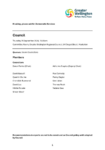Regional resource management framework updated by Greater Wellington
Enabling development in the right areas, protecting waterways and ecosystems, and responding to climate change are among the objectives of changes to Greater Wellington’s Regional Policy Statement - the framework for resource management in the Wellington Region.
Approved today by the regional council, the changes were developed and tested over the last three years, with help from two independent hearing panels that sat for 22 days, considering feedback from 161 submitters.
Greater Wellington chair Daran Ponter says the council is proud of the rigorous approach taken to updating the statement.
“The Regional Policy Statement guides district and regional planning that supports both the economy and the environment - all the way from the mountains to the sea, ki uta ki tai,” Cr Ponter says.
“For our mokopuna to inherit a healthy region, we now have guidelines for good development on land safe from natural hazards where connections to water and public transport infrastructure are optimal.”
The changes implement National Policy Statements on Urban Development, Freshwater Management and Indigenous Biodiversity, while initiating an equitable transition to a low-emissions and climate resilient region.
Greater Wellington deputy chair Adrienne Staples says submissions from rural communities were integral to changes aimed at food security, climate change mitigation and resilience.
“We’ve heard that change is hard and needs to be managed carefully but it’s the right thing to do for the region,” Cr Staples says.
“Food production and our water supply depend on climate stability. The changes encourage the region’s councils to step-up support for farming - by helping all sectors reduce emissions.
“Rural areas need more than forests to sink carbon. By keeping our best land productive, the changes will help regional communities grow through low carbon transport connections to compact urban centres, with sensibly placed subdivisions and energy efficient housing.”
Feedback from mana whenua was intrinsic to the changes, which take an integrated approach to development, the wellbeing of waterbodies (te Mana o te Wai), and the restoration of indigenous ecosystems.
Greater Wellington Tiriti o Waitangi chair Hikitia Ropata says Mātauranga Māori (traditional knowledge) shared by the region’s whaitua (catchment) committees has been incorporated into the changes.
“As kaitiaki, Māori see the bigger picture. We understand the long-term benefits of good resource management for the survival of taonga species and the prosperity of communities,” Cr Ropata says.
“Nature based solutions to natural hazards are among changes that recognise the value of Mātauranga Māori, as well as the directive for councils to partner with mana whenua on climate change adaptation planning.”
Following today’s decision, changes to the Regional Policy Statement for the Wellington Region will be publicly notified. For more information, visit:
Council 26 September 2024 Order Paper - Public

Council 26 September 2024 Order Paper - Public Read more here

date_range Published 23 Sep 2024
Download now (PDF 25 MB) get_appGet in touch
- Phone:
- 0800 496 734
- Email:
- info@gw.govt.nz
